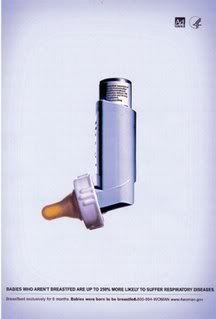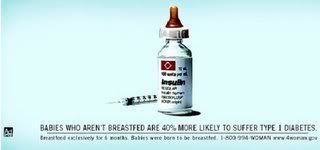First item of interest:
This article appeared on the front page of the Washington Post last week (you can also go here
Dr Jay is awesome! and see an item from 20/20's archives, Milk Money w/ one of my favorites, Dr. Jay Gordon):


HHS Toned Down Breast-Feeding Ads
Formula Industry Urged Softer Campaign
By Marc Kaufman and Christopher Lee
Washington Post Staff Writers
Friday, August 31, 2007; A01
In an attempt to raise the nation's historically low rate of
breast-feeding, federal health officials commissioned an
attention-grabbing advertising campaign a few years ago to convince
mothers that their babies faced real health risks if they did not
breast-feed. It featured striking photos of insulin syringes and asthma
inhalers topped with rubber nipples.
Plans to run these blunt ads infuriated the politically powerful infant
formula industry, which hired a former chairman of the Republican
National Committee and a former top regulatory official to lobby the
Health and Human Services Department. Not long afterward, department
political appointees toned down the campaign.
The ads ran instead with more friendly images of dandelions and
cherry-topped ice cream scoops, to dramatize how breast-feeding could
help avert respiratory problems and obesity. In a February 2004 letter,
the lobbyists told then-HHS Secretary Tommy G. Thompson they were
"grateful" for his staff's intervention to stop health officials from
"scaring expectant mothers into breast-feeding," and asked for help in
scaling back more of the ads.
The formula industry's intervention -- which did not block the ads but
helped change their content -- is being scrutinized by Congress in the
wake of last month's testimony by former surgeon general Richard H.
Carmona that the Bush administration repeatedly allowed political
considerations to interfere with his efforts to promote public health.
Rep. Henry A. Waxman's Committee on Oversight and Government Reform is
investigating allegations from former officials that Carmona was blocked
from participating in the breast-feeding advocacy effort and that those
designing the ad campaign were overruled by superiors at the formula
industry's insistence.
"This is a credible allegation of political interference that might have
had serious public health consequences," said Waxman, a California Democrat.
The milder campaign HHS eventually used had no discernible impact on the
nation's breast-feeding rate, which lags behind the rate in many
European countries.
Some senior HHS officials involved in the deliberations over the ad
campaign defended the outcome, saying the final ads raised the profile
of breast-feeding while following the scientific evidence available then
-- which they say did not fully support the claims of the original ad
campaign.
But other current and former HHS officials say the muting of the ads was
not the only episode in which HHS missed a chance to try to raise the
breast-feeding rate. In April, according to officials and documents, the
department chose not to promote a comprehensive analysis by its own
Agency for Healthcare Research and Quality (AHRQ) of multiple studies on
breast-feeding, which generally found it was associated with fewer ear
and gastrointestinal infections, as well as lower rates of diabetes,
leukemia, obesity, asthma and sudden infant death syndrome.
The report did not assert a direct cause and effect, because doing so
would require studies in which some women are told not to breast-feed
their infants -- a request considered unethical, given the obvious
health benefits of the practice.
A top HHS official said that at the time, Suzanne Haynes, an
epidemiologist and senior science adviser for the department's Office on
Women's Health, argued strongly in favor of promoting the new
conclusions in the media and among medical professionals. But her
office, which commissioned the report, was specifically instructed by
political appointees not to disseminate a news release.
Wanda K. Jones, director of the women's health office, said agency media
officials have "all been hammering me" about getting Haynes to stop
trying to draw attention to the AHRQ report. HHS press officer Rebecca
Ayer emphatically told Haynes and others in mid-July that there should
be "no media outreach to anyone" on that topic, current and former
officials said.
Both HHS and AHRQ ultimately sent out a few e-mail notices, but the
report was generally ignored. Requests to speak with Haynes were turned
down by other HHS officials.
Regarding the changes made to the earlier HHS ad campaign, Kevin Keane,
then HHS assistant secretary for public affairs and now a spokesman for
the American Beverage Association, said formula companies lobbied hard,
as did breast-feeding advocates.
"We took heat from the formula industry, who didn't want to see a
campaign like this. And we took some heat from the advocates who didn't
think it was strong enough," Keane said. "At the end of the day, we had
a ground-breaking campaign that goes further than any other
administration ever went."
But the campaign HHS used did not simply drop the disputed statistics in
the draft ads. The initial idea was to startle women with images starkly
warning that babies could become ill. Instead, the final ads cited how
breast-feeding benefits babies -- an approach that the ad company hired
by HHS had advised would be ineffective. The department also pulled back
on several related promotional efforts.
After the 2003-05 period in which the HHS ads were aired, the proportion
of mothers who breast-fed in the hospital after their babies were born
dropped, from 70 percent in 2002 to 63.6 percent in 2006, according to
statistics collected in Abbott Nutrition's Ross Mothers Survey, an
industry-backed effort that has been measuring breast-feeding rates for
more than 30 years. In 2002, 33.2 percent of women were doing any
breast-feeding at six months; by 2006, that rate had declined to 30 percent.
The World Health Organization recommends that, if at all possible, women
breast-feed their infants exclusively for at least six months.
* * *
The breast-feeding ad campaign originated in a formal "Blueprint for
Action on Breastfeeding" released in 2000 by David Satcher, who had been
appointed surgeon general by President Bill Clinton. The Office on
Women's Health convinced the nonprofit Ad Council to donate $30 million
in media time, and it hired an ad agency to work alongside scientists
from the National Institutes of Health, the Centers for Disease Control
and Prevention, and elsewhere.
Officials met with dozens of focus groups before concluding that the
best way to influence mothers was to delineate in graphic terms the
risks of not breast-feeding, an approach in keeping with edgy Ad Council
campaigns on smoking, seat belts and drunken driving. For example, an ad
portraying a nipple-tipped insulin bottle said, "Babies who aren't
breastfed are 40% more likely to suffer Type 1 diabetes."
Gina Ciagne, the office's public affairs specialist for the campaign,
said, "We were ready to go with our risk-based campaign -- making
breast-feeding a real public health issue -- when the formula companies
learned about it and came in to complain. Before long, we were told we
had to water things down, get rid of the hard-hitting ads and generally
make sure we didn't somehow offend."
Ciagne and others involved in the campaign said the pushback coincided
with a high-level lobbying campaign by formula makers, which are mostly
divisions of large pharmaceutical companies that are among the most
generous campaign donors in the nation.
The campaign the industry mounted was a Washington classic -- a
full-court press to reach top political appointees at HHS, using
influential former government officials, now working for the industry,
to act as go-betweens.
Two of the those involved were Clayton Yeutter, an agriculture secretary
under President George H.W. Bush and a former chairman of the Republican
National Committee, and Joseph A. Levitt, who four months earlier
directed the Food and Drug Administration's Center for Food Safety and
Applied Nutrition food safety center, which regulates infant formula. A
spokesman for the International Formula Council said both were paid by a
formula manufacturer to arrange meetings at HHS.
In a Feb. 17, 2004, letter to Thompson, Yeutter began "Dear Tommy" and
explained that the council wished to meet with him because the draft ad
campaign was inappropriately "implying that mothers who use infant
formula are placing their babies at risk," and could give rise to
class-action lawsuits.
Yeutter acknowledged that the ad agency "may well be correct" in
asserting that a softer approach would garner less attention, but he
said many women cannot breast-feed or choose not to for legitimate
reasons, which may give them "guilty feelings." He asked, "Does the U.S.
government really want to engage in an ad campaign that will magnify
that guilt?"
He also praised Keane, the HHS public affairs official, for making
"helpful changes" and removing "egregious statements," but asked that
more be done. Two months later, Yeutter wrote Thompson to thank him for
meeting with a group that included Levitt and an official of the
council. The group members supported breast-feeding, he said, but they
wanted HHS to use "positive visual images."
The formula companies also approached Carden Johnston, then president of
the American Academy of Pediatrics. Afterward, Johnston wrote a letter
to Thompson advising him that "we have some concerns about this negative
approach and how it will be received by the general public."
The letter made a strong impression at HHS, former and current officials
said. But it angered many of the medical group's members and the head of
its section on breast-feeding, Lawrence M. Gartner, a Chicago physician.
Gartner told Thompson in a letter that the 800 members of the
breast-feeding section did not share Johnston's concerns and had not
known of his letter.
"This campaign needed to be much stronger than it was," Gartner said,
adding that in his view, the original ads were backed by solid
scientific evidence.
According to former and current HHS officials, Cristina V. Beato, then
an acting assistant secretary at HHS, played a key role -- in addition
to that of Keane -- in toning down the ads. They said she stressed to
associates that it was essential to "be fair" to the formula companies.
Beato was then serving in an acting capacity because lawmakers refused
to vote on her confirmation because of complaints that she had padded
her official r?sum?. In a 2004 interview with the ABC newsmagazine
"20/20," which described some of the industry's efforts to change the
breast-feeding ad campaign, Beato confirmed that she "met with the
industry, because they kept calling my office, every two weeks." She
said in a telephone interview that their complaints played no role in
her decisions.
"I brought together our top public health people to examine the health
claims, and they examined the science and concluded what should be in
and what should be out," Beato said.
Duane Alexander, head of the government's National Institute of Child
Health and Human Development, was among the officials contacted by the
industry who later supported eliminating some of the ads.
"Our concern was that the campaign was going to discredit itself if it
included these things -- these wild claims really -- that had no
sufficient basis in science," Alexander said.
Another top agency official who weighed in on the campaign was Ann-Marie
Lynch, then in charge of the agency's Office of Planning and Evaluation.
Lynch, a former lobbyist for the drug industry trade association PhRMA,
reversed an HHS decision to finance a $630,000 community outreach effort
to promote breast-feeding, according to an e-mail obtained by The
Washington Post. Asked to comment, Lynch said she never discussed "baby
formula issues with baby formula manufacturers" at HHS.
Speaking to the International Lactation Consultant Association in 2005,
Haynes, of the HHS women's health office, said she was "overruled."
Veteran pediatrician and breast-feeding researcher Ruth A. Lawrence of
the University of Rochester, who was on the initial advisory committee
brought together by Haynes, said the science undergirding the ads was
"entirely convincing. Everyone on the committee had to agree on a
finding before it was approved. We were very distressed by what happened."
After the changes, the advertising company, McKinney + Silver of Durham,
N.C., withdrew from the campaign in protest, according to sources inside
and outside HHS. A company spokeswoman declined to comment. Carmona,
meanwhile, was told that Beato and HHS press officer Christina Pearson
did not want him to become involved in the campaign's launch or in any
public promotion of the underlying themes, according to current and
former HHS officials. Beato and Pearson said they do not recall giving
that advice.
The industry substantially increased its own advertising as soon as the
HHS campaign was launched. According to a 2006 report by the Government
Accountability Office, formula companies spent about $30 million in 2000
to advertise their products. In 2003 and 2004, when the campaign was
underway, infant formula advertising increased to nearly $50 million.
Staff researcher Madonna Lebling contributed to this report.




